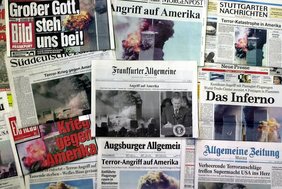From the “War on terror” to Societal Peace

Even in its early years, the work of the IFSH reflected the assumption that, even in a democratic society, peace and security are dependent on certain conditions and cannot be taken for granted. Wolf Graf von Baudissin’s concept of soldiers as “citizens in uniform” served, first and foremost, the evolution of the axiomatic nature of the armed forces and their anchoring in democratic society; however, they were also intended to be part of a broader process of democratization within that society. Nevertheless, the Institute’s work, set against the backdrop of the East-West conflict, initially concentrated on the analysis of peace and security (or the lack thereof) between nations. Following this phase, the IFSH then broadened its research to include processes of democratization and intra-societal reconciliation in post-conflict societies in peripheral European nations, such as in Yugoslavia after the civil wars.
With the beginning the new millennium, the attacks of 11 September 2001 in particular brought a broader spectrum of violence manifestations and discourses of threat into focus. Many of these challenges, and transnational terrorism especially, could no longer be clearly designated as issues of external or internal security. In response to this, the IFSH established a new research program on the “transnationalization of the risk of violence”. Under the heading “Security Governance”, this program examined, among other things, how western democracies seek to ensure security amidst shifting conditions, by outsourcing individual security responsibilities to private actors, for example, or by utilizing new types of risk analysis.
A major focus on the Institute’s work during this time was a critical analysis of the ‘War on Terror’. This context also spotlighted the relationship between security, freedom and democracy. A German Research Foundation (DFG) project examined patterns of political justification related to the restriction of civil liberties. Twenty years after 9/11, and in the year of the IFSH’s 50th anniversary, members of the Institute are using the current moment to take stock, but also to discuss both enduring and new challenges in dealing with terrorist violence. This concerns, for example, democratic oversight of intelligence services, which were significantly expanded after 2001.
In the last few years, the range of topics that the IFSH’s research addresses has again been broadened. The background to this were developments that brought to light the fractures and polarization within European societies and which were accompanied in several cases by manifest violence. Political decisions with regard to the euro and the financial crisis, or to the so-called “migrant crisis”, led to protests and clashes that were sometimes violent. Far-right violence increased, and many countries saw a notable rise in populist and illiberal movements.
For this reason, in the IFSH research program Peace Strategies at the Fracture Points of Globalization, a working group on “new potentials for intra-societal violence” examined whether “democratic peace” could erode, even at its place of origin, against the backdrop of upheaval brought about by globalisation and of increasing societal division. In doing so, research into far-right radicalization and violence increased in importance. Through projects such as the Federal Ministry of Education and Research-funded (BMBF) PANDORA, the IFSH team developed particular expertise on the role of the internet and social media. It should be recalled that 2021 also marks ten years since Anders Behring Breivik perpetrated attacks in Oslo and on the island of Utøya, and since crimes committed by National Socialist Underground (NSU) were uncovered.
Against this backdrop, the IFSH decided in 2018 to establish a designated research area under the title Societal Peace and Internal Security. This research also rests on the assumption that peace and security are fragile even in established democracies, albeit for different reasons than in Baudissin’s time. The research area has since been firmly established as an integral part of the Institute’s work. It is currently focused in particular on how security and peace can be shaped within democratic societies under the conditions of globalization and intra-societal polarization. The research area examines if and how illiberal, anti-pluralist movements pose a challenge to democratic societies, and what new potentials for violence are connected to them. It also analyses how nations and societies respond to these developments and which problems stand out in the process, with a view to the relationship between security and freedom, for example. More concretely, a BMBF-funded project is concerned with political and societal approaches to radical Islam.
Another BMBF-funded project analyses how European institutions attempt to encourage cohesion in and between European societies by establishing a sweeping promise of security and protection as the new guiding narrative of European integration. The coronavirus pandemic and the societal and political debates related to it illustrate how relevant these topics are and most likely will remain. Therefore, even after 50 years, it is highly unlikely that the IFSH and its members will run out of work in this field in the foreseeable future.
